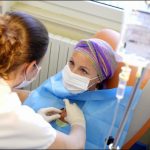Chemotherapy can trigger drug-resistant leukemia upon relapse
 (NaturalHealth365) Acute lymphoblastic leukemia (ALL) ranks as the second most prevalent form of acute leukemia among adults, with an annual incidence exceeding 6500 cases in the United States alone. According to the Centers for Disease Control and Prevention, ALL is responsible for 20% of all cancers in people younger than 20 years old. Sadly, the Dana-Farber Cancer Institute finds that up to 1 in 5 kids who undergo chemotherapy for ALL will relapse – even if they initially receive a complete remission of the cancer.
(NaturalHealth365) Acute lymphoblastic leukemia (ALL) ranks as the second most prevalent form of acute leukemia among adults, with an annual incidence exceeding 6500 cases in the United States alone. According to the Centers for Disease Control and Prevention, ALL is responsible for 20% of all cancers in people younger than 20 years old. Sadly, the Dana-Farber Cancer Institute finds that up to 1 in 5 kids who undergo chemotherapy for ALL will relapse – even if they initially receive a complete remission of the cancer.
Alarmingly, new research suggests that chemotherapy may harbor the potential to induce genetic alterations that contribute to the evolution of drug-resistant leukemia upon relapse. Further evidence confirms the frightening correlation: the chemotherapy itself may be responsible for many of these cancer relapses!
Shocking news for the general public: Chemotherapy is responsible for 20% of leukemia relapse cases
ALL is a type of cancer that develops when a person’s bone marrow begins to overproduce white blood cells called lymphocytes. The disease tends to progress quickly, causing the new lymphocytes to be immature. When the immature lymphocytes begin to outnumber the mature white blood cells, it becomes difficult for a person to fend off infections.
ALL is the most common childhood cancer. While outcomes are generally favorable, anywhere from 15 to 20% of children experience a relapse of their leukemia, and the disease can be fatal.
A paper published in the journal Blood suggests a disturbing explanation for some of these cases of relapse – what the authors call “chemotherapy-induced drug resistance mutations.”
The researchers performed genome-sequencing in 103 young ALL patients with a history of cancer relapse. They discovered mutational “signatures” in about 20% of these patients that were consistent with chemotherapy drug resistance.
Based on their findings, the authors suggest that chemotherapy can induce certain genetic mutations and “facilitate a subset of pediatric ALL relapses.” They also suggest that less toxic therapies and more individualized approaches to cancer management should be undertaken.
Considering that the vast majority of people who die of ALL will experience a relapse first, the importance of this cannot be understated. Unfortunately, this isn’t the only reason medical professionals are concerned about chemotherapy drugs.
Another study has echoed a concerning conclusion, indicating that patients receiving chemotherapy face the potential development of therapy-related myeloid neoplasms (tMN), a specific type of leukemia. While this research did not exclusively focus on patients with acute lymphoblastic leukemia (ALL), its implications extend to patients undergoing cytotoxic treatments for various cancers. Before these aggressive cancers develop, there are early signs called preleukemic clones, detectable years prior, but the exact genetic events leading to their transformation aren’t fully understood.
The researchers used genetic data from whole-genome sequencing to track the development of 39 cases of tMN, revealing two main groups: one with mutations induced by certain chemotherapies like platinum and melphalan and another resembling typical acute myeloid leukemia. Interestingly, the study also found that certain chemotherapies can not only select existing preleukemic clones but also encourage the growth of specific genetic mutations, leading to tMN.
At least two other notable health risks are associated with chemotherapy beyond drug-induced relapse, research finds
Chemotherapy drugs are cytotoxic chemicals and are considered the main type of treatment for ALL and other cancers. These include powerful man-made drugs like cytarabine, doxorubicin, asparaginase, and methotrexate. These may be administered for up to two years or longer and can exact widespread effects on the body.
As an example, it’s well-known that chemotherapy often leads to debilitating side effects, including nausea, an increased risk for infections, neuropathy, gastrointestinal distress, and trouble breathing. But as we’ve already reported here before, chemotherapy may also lead to other serious health problems, including:
- Brain damage and memory loss
- Accelerated aging and an increased risk of premature death
Are cancer patients – or, in the case of ALL and other types of pediatric leukemia, the patients’ caregivers – being informed about these dangerous and potentially deadly effects of chemotherapy? Could we save the lives of hundreds of American children every year simply by exploring other cancer treatment options beyond the knee-jerk reaction to stick everyone on chemotherapy?
Based on the research, we think it’s possible – and we think it’s a conversation more medical professionals need to have.
Editor’s note: Discover the many natural ways to stop cancer cell growth, own the Stop Cancer Docu-Class created by NaturalHealth365 Programs.
Sources for this article include:
NIH.gov
Nature.com
Eurekalert.org
Cancerresearchuk.org
Medicalnewstoday.com
Ashpublications.org
Mayoclinic.org
CDC.gov



